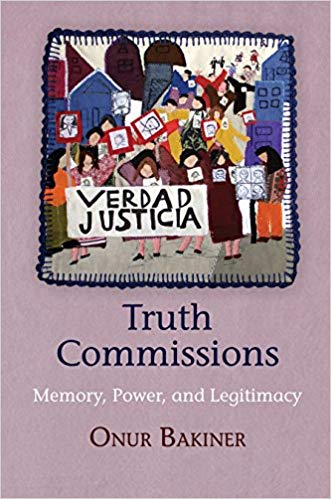Since the 1980s a number of countries have established truth commissions to come to terms with the legacy of past human rights violations, yet little is known about the achievements and shortcomings of this popular transitional justice tool. Drawing on research on Chile's National Truth and Reconciliation Commission and Peru's Truth and Reconciliation Commission, and exploring the scholarship on thirteen other transitional contexts, Onur Bakiner evaluates the success of truth commissions in promoting policy reform, human rights accountability, and the public recognition of human rights violations. He argues that although political elites often see a truth commission as a convenient way to address past atrocities, the findings, historical narratives, and recommendations of such commissions often surprise, upset, and discredit influential political actors. Even when commissions produce only modest change as a result of political constraints, Bakiner contends, they open up new avenues for human rights activism by triggering the creation of new victims' organizations, facilitating public debates over social memory, and inducing civil society actors to monitor the country's human rights policy.
Bakiner demonstrates how truth commissions have recovered basic facts about human rights violations, forced societies to rethink the violence and exclusion of nation building, and produced a new dynamic whereby the state seeks to legitimize its central position between history and politics by accepting a high degree of societal penetration into the production and diffusion of official national history. By doing so, truth commissions have challenged and transformed public discourses on memory, truth, justice, reconciliation, recognition, nationalism, and political legitimacy in the contemporary world.
چکیده فارسی
از دهه 1980، تعدادی از کشورها برای کنار آمدن با میراث نقض حقوق بشر در گذشته، کمیسیونهای حقیقت را تأسیس کردهاند، اما اطلاعات کمی در مورد دستاوردها و کاستیهای این ابزار عدالت انتقالی محبوب وجود دارد. اونور باکینر با تکیه بر تحقیقات در مورد کمیسیون حقیقت و آشتی ملی شیلی و کمیسیون حقیقت و آشتی پرو، و بررسی بورس تحصیلی در سیزده زمینه انتقالی دیگر، موفقیت کمیسیون های حقیقت را در ارتقای اصلاح سیاست، پاسخگویی حقوق بشر، و به رسمیت شناختن عمومی انسان ارزیابی می کند. نقض حقوق او استدلال میکند که اگرچه نخبگان سیاسی اغلب کمیسیون حقیقت را راهی مناسب برای رسیدگی به جنایات گذشته میدانند، یافتهها، روایتهای تاریخی و توصیههای چنین کمیسیونهایی اغلب بازیگران سیاسی با نفوذ را غافلگیر، ناراحت و بیاعتبار میکنند. باکینر معتقد است، حتی زمانی که کمیسیونها در نتیجه محدودیتهای سیاسی تنها تغییرات اندکی ایجاد میکنند، با ایجاد سازمانهای قربانیان جدید، تسهیل بحثهای عمومی در مورد حافظه اجتماعی و ترغیب بازیگران جامعه مدنی به نظارت، راههای جدیدی را برای فعالیتهای حقوق بشری باز میکنند. سیاست حقوق بشر کشور.
باکینر نشان میدهد که چگونه کمیسیونهای حقیقت حقایق اساسی در مورد نقض حقوق بشر را به دست آوردهاند، جوامع را مجبور به تجدیدنظر در مورد خشونت و محرومیت از ملتسازی کردهاند، و پویایی جدیدی را ایجاد کردهاند که به موجب آن دولت میکوشد موقعیت مرکزی خود را بین تاریخ و سیاست با پذیرش یک قانون مشروعیت بخشد. درجه بالایی از نفوذ اجتماعی در تولید و اشاعه تاریخ رسمی ملی. با انجام این کار، کمیسیون های حقیقت، گفتمان های عمومی در مورد حافظه، حقیقت، عدالت، آشتی، به رسمیت شناختن، ملی گرایی و مشروعیت سیاسی در جهان معاصر را به چالش کشیده و تغییر داده اند.
ادامه ...
بستن ...
Ebook details:
عنوان: Truth Commissions: Memory, Power, and Legitimacy (Pennsylvania Studies in Human Rights)
نویسنده: Onur Bakiner
ناشر: University of Pennsylvania Press (December 18, 2015)
زبان: English
شابک: 0812247620, 978-0812247626
حجم: 3 Mb
فرمت: True Pdf
ادامه ...
بستن ...










